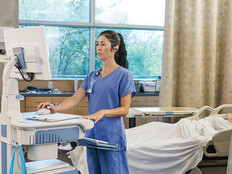Devices Offer Service on Demand
The benefits are many. Better outcomes positively impact reimbursements, and the devices’ efficiencies allow staff to redirect care where it is most urgently needed.
The global smart speaker market is poised see a continued annual growth rate of nearly 24 percent through 2023, according to research by Technavio. An IHS Markit Technology report predicts more than 900,000 such devices will be used in healthcare by next year, and diverse initiatives already are in motion.
Earlier this year, a pilot project at Cedars-Sinai placed 100 Amazon Echo devices in patient rooms throughout the hospital. Using an Alexa-powered platform, users may speak to access entertainment options and, if needed, request staff assistance.
Boston Children’s Hospital is targeting parents with KidsMD, an Alexa skill that offers information about common ailments and medication dosing. Another, the Mayo Clinic First Aid skill, was launched by the Mayo organization to suggest care tips for nonemergency situations.
Atlanta-based Thrive Senior Living is leveraging Google and Amazon smart speakers to support a custom suite of applications that route requests and questions to care teams. A test run found that residents liked the approach, and employees came better equipped to assist patients thanks to information they received on a connected mobile app.
And last October, with the help of CDW, a four-bedroom home for older adults with disabilities managed by Easterseals Southern California was outfitted with Google Home and other smart devices that respond to preset commands — such as “good morning” to raise window blinds — and are personalized to the needs of each user.
There’s major potential in the power of voice.
INSIDER EXCLUSIVE: Watch a CDW Bring IT On session about connecting seniors and technology.
How to Ensure User Privacy When Using Smart Speakers
Special precautions must be taken when implementing smart speakers in healthcare settings.
Amazon recognized this last year by adding new HIPAA-compliant features for Alexa. Additional security steps, however, are needed. These may include network segmentation, using only building-owned devices and limiting skills to those focused on care. Also crucial is robust network infrastructure to accommodate bandwidth needs.
Finally, staff and patients must be taught cybersecurity best practices. The LeadingAge Center for Aging Services Technologies recently published detailed recommendations for senior care providers looking to adopt voice technology — insights that are relevant to hospitals and clinics too. The report’s key takeaway: Have a plan, and put it in writing.
More work remains, but I’m encouraged by the number of smart speaker rollouts and their growing role in care delivery. It’s progress we all should be talking about.











